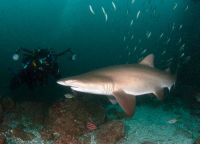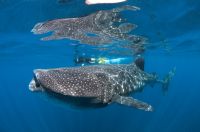Sharks are very valuable as a live, renewable resource to the tourism industry. Divers are very interested in seeing sharks alive and healthy in the ocean and are willing to pay a lot to see them (White 2008). A recent study found that shark tourism companies operate in 83 locations in 29 countries (Gallagher and Hammerschlag 2011).
Dive ecotourism also provides income and other community benefits in many areas through diver tag fees paid through local or regional agreements, employment in ecotourism operations, and purchase of goods and services (Heinrichs 2008; Udelhoven et al. 2010). There are also the indirect revenues (including food, accommodation and transport) which can be several times higher. Many studies on the ‘global shark currency’ have yet to describe the tourism multiplier which includes indirect revenues, i.e. a tourist pays a hotel for a room, the hotel uses that money to pay for goods and services, which in turn serves as income for secondary and primary industries within a country. The impact of well managed shark-based tourism could have profound effects on the communities and countries that develop them.
The location and value of shark and ray-based diving industries:
|
Location |
Activity |
Value (per year) |
Reference |
|
Bahamas |
Sharks |
US$ 78 million |
Cline 2008 |
|
Belize |
Whale Shark |
US$ 3.7 million |
Graham 2004 |
|
Canary Islands |
Shark and Ray |
US$ 22.8 million |
De la Cruz Modino et al. 2010 |
|
Fr. Polynesia |
Lemon Shark |
US$ 5.4 million |
Clua et al. 2011 |
|
Maldives |
Sharks |
US$ 38.6 million |
Martin et al. 2006 |
|
Palau |
Sharks |
US$ 18 million |
Vianna et al. 2012 |
|
Seychelles |
Sharks |
US$ 4.5 million |
Topelko and Dearden 2005 |
|
Seychelles |
Whale Shark |
US$ 4.99 million |
Rowat and Engelhardt 2007 |
|
South Africa |
Tiger Shark |
US$ 1.7 million |
Dicken and Hosking 2009 |
|
South Africa |
White Shark |
US$ 4.2 million |
Hara et al. 2003 |
|
West Australia |
Whale Shark |
US$ 12 million |
Martin et al. 2006 |
 The estimated annual value of a single grey reef shark in the Maldives in 1992 was US$ 33,500 and US$ 603,000 over the typical 18 year life-span (Anderson and Ahmed 1993).
The estimated annual value of a single grey reef shark in the Maldives in 1992 was US$ 33,500 and US$ 603,000 over the typical 18 year life-span (Anderson and Ahmed 1993).
On the basis of willingness to pay, Waheed (1998) estimated that reef sharks had a nominal value of US$6.6 million as attractions for tourist divers in 1997, accounting for direct revenue.
In the Red Sea it is estimated that each medium-to-large size shark brings in approximately US$200,000 each year through tourism. In comparison, a poacher might sell a shark, or just a pair of fins, to a restaurant for US$150-200 at black market prices (Kresh 2012).
In Palau, the value of one reef shark to the tourism industry is estimated at US$179,000 per year, adding up to a lifetime value of US$1.2 million. A fishery targeting the same 100 sharks that are interacting with the tourism industry in Palau would obtain a maximum of US$10,800, or 0.00006% of the life-time value of these animals as a non-consumptive resource (Vianna et al. 2012).
In the Bahamas shark diving operations bring an estimated US$ 78 million per year to the local economy (Cline 2008). The Bahamas passed a law making it illegal to kills sharks or possess or trade shark products because the people felt it would jeopardize their valuable shark diving business (Lowe 2011).
"In Maldives, sharks have a particularly valuable role in the tourism industry, which generates some 30 per cent of the country’s GDP. According to surveys, about 30 per cent of tourists visit the Maldives for its underwater marine with life, viewing sharks and manta rays as their top priorities.” (Ndurya and Kihara 2009)
In Fiji, 100 sharks in Beqa Lagoon generate $30,000 per shark, or $3,000,000 annually through dive tourism, and this revenue will continue as long as there are sharks to visit and dive with (Loanakadavu 2010).
The loss of diving revenue when a popular dive site’s shark population is heavily impacted by fishing can be US$ 500,000 per year (Anderson 1998).

In Gujurat, India and Donsol, Philippines, communities that once hunted whale sharks are now benefiting from booming tourism industries, based on encounters with live whale sharks (Pine 2007; Chaudhary 2008).
“The whale sharks’ appearance in Donsol has continued to be a benefit to the local economy. Early records show 800 visitors to Donsol in 1998 with a total income of US$ 10,500, generated from registration fees and boat rentals. The number of visitors increased to approximately 7200 in 2005, generating an estimated income of US$208,000. Arevalo (2006) notes that revenues derived from tourism efforts (related to whale sharks) resulted in Donsol being elevated from a fifth class municipality (annual income of US$ 162,000 to a fourth class US$ 301,000-486,000). This resulted in a shift from Rank 76 in the poverty line amongst the poorest municipalities of the region to a rank of 17 (Arevalo 2006). In addition, since 2002 more than 300 jobs have been created and in excess of 200 fishermen have gained seasonal employment as a result of whale shark ecotourism.” (Normal and Caitlan 2007).
“Eco-tourism has changed everyone's life in Donsol. Alan tells us how he used to have to take on odd jobs -- driving a tricycle taxi, construction work, playing guitar at bars -- to make ends meet. Now he makes six times what he used to, enough money to put his two children through school, even university.”(Damon 2010).
Anderson R.C. 1998. Sharks mean business. Scientific American Presents, 9(3): 72-73.
Anderson R.C. and Ahmed H. 1993. Shark fisheries of the Maldives. Ministry of Fisheries &
Agriculture, Maldives & FAO, Rome, 73pp.
Chaudhary, R. G. Joshi, D., Mookerjee, A., Talwar V., and Menon, V. 2008. Turning the tide: the campaign to save Vhali, the whale shark (Rhincodon typus) in Gujarat. Wildlife Trust of India, NOIDA, Uttar Pradesh.
Cline,W. 2008. Shark diving overview for the islands of the Bahamas. Nassau, Report of the Bahamas Ministry of Tourism. Nassau, Bahamas: Cline Marketing Group.
Clua, E., Buray, N., Legendre, P., Mourier, J., Planes, S., 2011. Business partner or simple catch? The economic value of the sicklefin lemon shark in French Polynesia. In: Marine and Freshwater Research, 2011, 62, 764-770.
Pine, R. 2007. Donsol: Whale shark tourism and coastal resource management, A Case Study of the Philippines. WWF-Philippines, Quezon City, Philippines. 41 pp.
Damon, A. 2010. Swimming with sharks saves lives. CNN June 7, 2010. http://www.cnn.com/2010/WORLD/asiapcf/06/04/eco.whale.shark/?hpt=C2
De la Cruz Modino, R., Esteban, A., Crilly, R., Pascual-Fernandez, J. 2010. Bucear con tiburones y rayas en Espana. Analisis de su potencial en Espana y en las Islas Canarias., Instituto Universitario de Ciencias Politicas y Sociales NEF- The New Economics Foundation: 8-16.
Dicken, M.L. and Hosking, S.G. 2009. Socio-economic aspects of the tiger shark diving industry in the Aliwal Shoal Marine Protected Area, South Africa. African Journal of Marine Science, 31(2): 227-232.
Gallagher, A.J. and Hammerschlag, N. 2011. Global shark currency: the distribution, frequency, and economic value of shark ecotourism. Current Issues in Tourism, 1-16.
Graham, R.T. 2004. Global Whale Shark Tourism: A "Golden Goose" of Sustainable Lucrative Tourism. Shark News 16, (October)
Hara, M., Maharaj, I., and Pithers, L. 2003. Marine-based Tourism in Gansbaai: a socio-economic study. The Department of Environmental Affairs Programme for Land and Agrarian Studies, University of the Western Cape, South Africa, 56 pp.
Heinrichs, S. 2008, A Private Sector Approach – Conservation Agreements in support of Marine Protection. Asia-Pacific: Indonesia, Conserving in Papua, Indonesia through Ecotourism.
Kresh, M. 2012. Egypt’s Red Sea Sharks Face Extinction. Green Prophet Jan. 1, 2012. http://www.greenprophet.com/2012/01/egypts-red-sea-sharks-face-extinction/
Loanakadavu, S. 2010. Long Live the Shark. Fiji Times Onine. July 18, 2010.
Lowe, A. 2011. Shark dives bite off $78m tourism spend. The Tribune, Jan. 7, 2011. http://www.tribune242.com/business/01072011_alsharks_business_pg1-Lead
Martin, R.A. and Hakeem, A.A.A. 2006. Development of a Sustainable Shark Diving Ecotourism Industry in the Maldives: Challenges and Opportunities. Maldives Marine Research Bulletin, 8: 2-36.
Ndurya, M and Kihara, G. 2009. Maldives to ban reef shark fishing by March 2010. The East African http://www.theeastafrican.co.ke/news/-/2558/667720/- /qy9ux0z/-/index.html
Norman, B. and Catlin, J. 2007. Economic importance of conserving whale sharks. Report for the International Fund for Animal Welfare, Australia. 1-18 pp.
Rowat D, and Engelhardt U. 2007. Seychelles: A case study of community involvement in the development of whale shark ecotourism and its socio-economic impact. Fisheries Research 84: 109–113.
Topelko, K.N., and Dearden, P. 2005. The shark watching industry and its potential contribution to shark conservation. Journal of Ecotourism, 4(2): 108-128.
Udelhoven, J, Carter, E. Gilmer, B, 2010. MCA Feasibility Analysis – Final Interim Findings Public Version, August 4, 2010, The Nature Conservancy.
Vianna, G., Meekan, M., Pannell, D., Marsh, S., Meeuwig, J. 2012. Socio-economic value and community benefits from shark-diving tourism in Palau: A sustainable use of reef shark populations. Biological Conservation 145 (2012) 267-277.
Waheed, A. 1998. Economic value of ‘marine ecotourism’ in the Maldives. Bay of Bengal News, 12(2): 23.
White, L. 2008. Sea the value: quantifying the value of marine life to divers. Msc thesis, Nicholas School of the Environment and Earth Sciences of Duke University, Durham, North Carolina.
Anderson, C. and Waheed, A. 2001. The economics of shark and ray watching in the Maldives. Shark News, 13.
Baske, A. 2008. Can recreational diver surveys lead to conservation action? A case study of the Revillagigedo Archipelago. MAS Capstone, Center for Marine Biodiversity and Coservation.
Bennett, M., P. Dearden and R.Rollins. 2002. The sustainability of dive tourism in Phuket, Thailand. In Communities in SE Asia: Challenge and Responses ed by H. Lansdowne, P. Dearden and W.Neilson, University of Victoria, Centre for Asia-Pacific Initiatives pp 93-102.
Brunnschweiler, J. M. 2009. The Shark Reef Marine Reserve: a marine tourism project in Fiji involving local communities. Journal of Sustainable Tourism, 1 1-14.
Coleman, N., Marsh, N., and Ritchie, R. 2003. Diving Australia: A Guide to the Best Diving Down Under. Tuttle Publishing, 348 pp.
Fowler, S. 2005. The international and national frameworks for conservation and management of sharks: Recommendations for Ecuador. Contribution to Ecuador’s Draft National Plan of Action for the Conservation and Management of Sharks. IUCN, Quito, Ecuador. 51 pp.
Hotchkin, T. “Swimming with Sharks - Scuba Diving in the Galapagos Islands” http://ezinearticles.com/?-Swimming-with-Sharks---Scuba-Diving-in-the-Galapagos-Islands&id=3927495
Jones, T., Wood, D., Catlin, J. and Norman, B. 2009. Expenditure and ecotourism: predictors of expenditure for whale shark tour participants. Journal of Ecotourism, 8 (1): 32.
Newman, H.E., and Medcraft, A.J. 1997. Whale shark tagging and ecotourism. Elasmobranch Biodiversity, Conservation and Management. Proceedings of the International Seminar and Workshop, Sabah, Malaysia.
Pine, R. 2007. Donsol: Whale shark tourism and coastal resource management, A Case Study of the Philippines. WWF-Philippines, Quezon City, Philippines. 41 pp.
Stacey, N.E., Karam, J., Meekan, M. G., Pickering, S., and Ninef, J. 2012. Prospects for whake shark conservation in Eastern Indonesia through Bajo Traditional ecological knowledge and community-based monitoring. Conservation and Society, 10(1): 63-75.
Stafford-Deitsch, J. 1999. Red Sea Sharks. Trident Press Ltd. p. 40
Tibirica, Y. Birtles, A. Valentine, P., and Miller, D.K. 2009. Diving tourism in Mozambique-An opportunity at risk. Proceedings of Congress on Coastal and Marine Tourism, Nelson Mandela Bay, South Africa, 12 pp.
“Falling Shark Numbers Puts Bite on Tourism -- SHARKS are worth more alive than dead as new research shows the ocean predators draw a healthy chunk of the tourist dollar.” James Cook University Study, Australian Associated Press, October 20, 2009
“Sharks help live-aboard dive boats rake in tourism dollars.” Marie and Tropical Sciences Research Facility, Australian Government. Media Release April 24th 2009
https://mckenziewestmore.com/en/blogs/635-honduras-and-the-maldives-join-the-ranks-of-shark-sanctuaries.html 2010. “Honduras and the Maldives join the ranks of shark sanctuaries”.